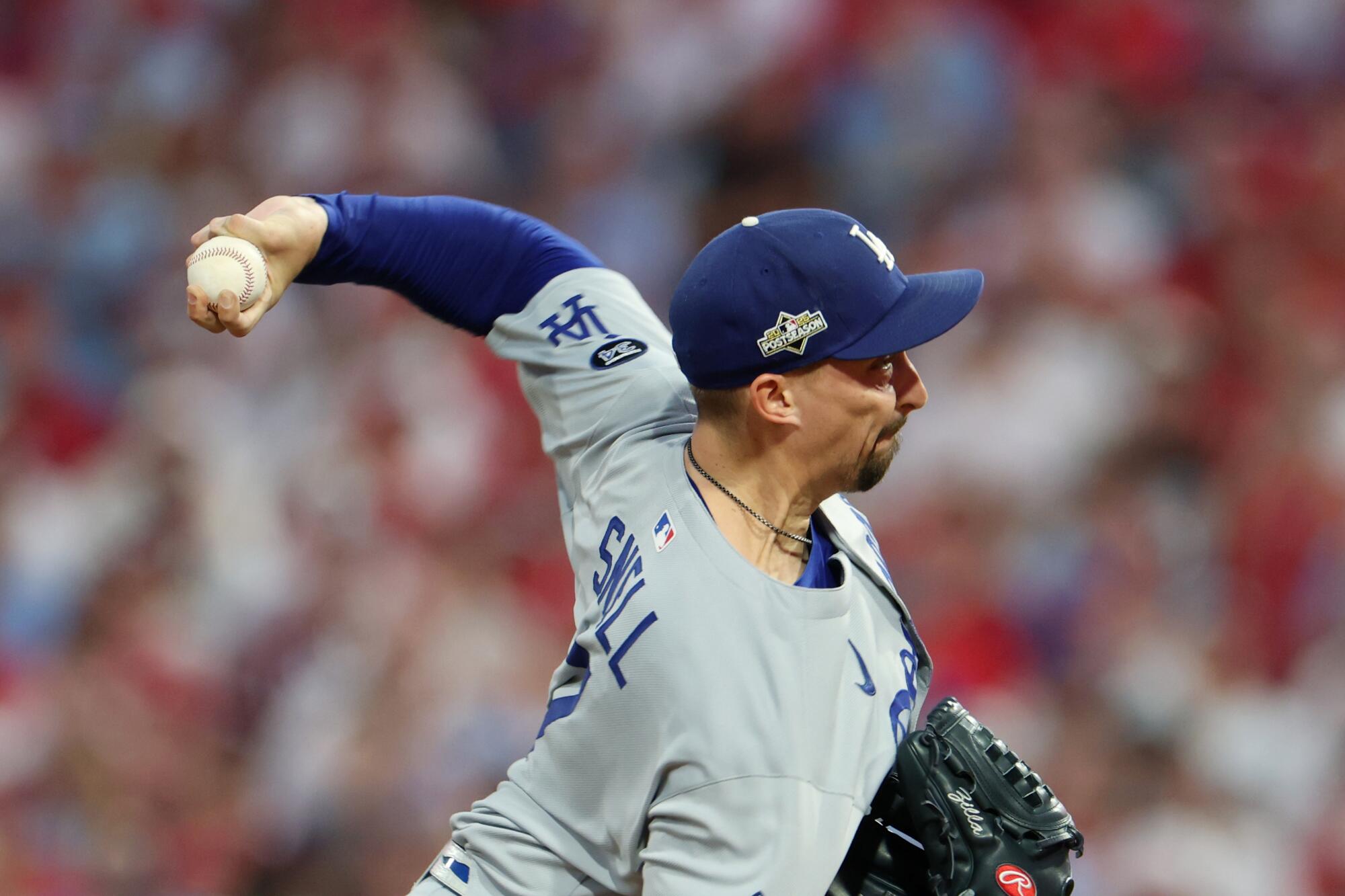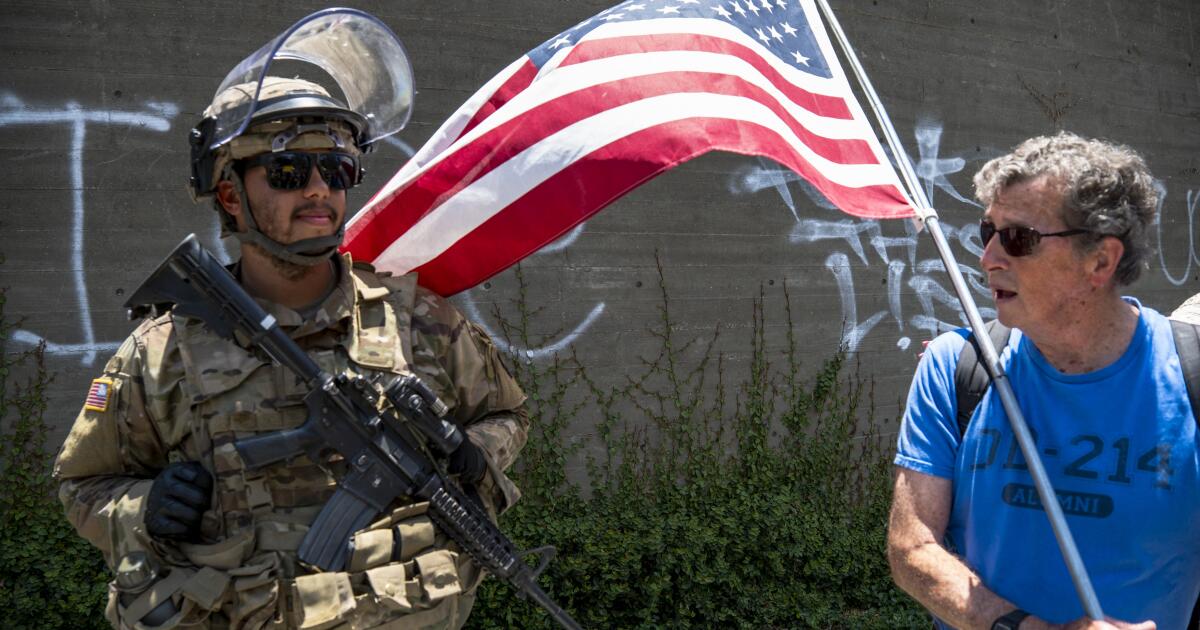Dodgers lean on big inning to defeat Phillies and take 2-0 NLDS lead
PHILADELPHIA — It was quintessential October baseball.
Two starting pitchers dominating two helpless lineups.
A low-scoring contest in which every stranded baserunner felt like a monumental missed opportunity.
A nail-biting affair decided by one team cashing in a rare scoring chance, and the other failing to do the same.
In the bottom of the sixth inning in Game 2 of the National League Division Series on Monday, the Philadelphia Phillies had two aboard with one out, but came up empty.
In the next half-inning, the Dodgers faced the same situation, but came away with four runs.
That was the difference in the Dodgers’ 4-3 victory at Citizens Bank Park, giving them a commanding 2-0 lead in a best-of-five series that will shift to Dodger Stadium for Game 3 on Wednesday.
Dodgers pitcher Blake Snell delivers during the second inning Monday against the Phillies.
(Robert Gauthier / Los Angeles Times)
For most of Monday night, a crowd of 45,653 in South Philadelphia sat anxiously in anticipation, waiting for the dam to break in an old-fashioned pitchers’ duel.
On one side, Blake Snell was dotting his fastball up in the zone and to both parts of the plate, giving the Phillies little to hit while setting them up to flail at his dominant arsenal of secondary weapons. Through four innings, he retired 12 of 14 batters with only two walks issued. He had gotten whiffs on each of the first 11 non-fastballs he threw. And not until there were two outs in the fifth did he give up his first hit.
Opposite him, Jesús Luzardo was equally effective. After stranding runners on the corners in a shaky first, the left-hander locked in and made the Dodgers look silly with a barrage of sweepers and changeups that dipped below the zone. Where he needed 24 pitches in the first, he completed the next five on just 48 throws. In that time, he retired 17 in a row and let only two balls even leave the infield.
Finally, in the bottom of the sixth, the narrative began to change.
The Phillies generated the game’s first big opportunity, after Trea Turner and Kyle Schwarber walked in back-to-back at-bats against Snell with one out. It was the first time all night their lineup had gotten a runner past first. And it happened as two-time MVP Bryce Harper came strolling to the plate.
Snell’s plan of attack against Harper was simple. His first pitch was a slider in the dirt. His next was another one up in the zone Harper fouled off. Two more sliders followed, with Harper fanning on the first and fouling off the next. Then, after one change-of-pace curveball was buried in front of the plate, Snell went back to the slider one more time. It darted below Harper’s swing for a strikeout. Citizens Bank Park groaned.
The inning ended a batter later, when Alec Bohm chased a 2-and-0 changeup and hit a groundball to third base. Miguel Rojas fielded it behind the bag, clocked the speedy Bohm racing toward first, and decided to go the short — albeit risky — way instead, sprinting to third base and beating Turner to the bag with a headfirst slide.
That ended the inning. This time, frustrated boos rained down from the stands.

Minutes later, the Dodgers would be in front. Unlike the Phillies, they didn’t squander their one opportunity for runs.
Teoscar Hernández led off the top of the seventh with a single. Freddie Freeman followed with a line drive to weak-fielding Nick Castellanos (who was drawn into the Phillies’ lineup following an injury to Harrison Bader in Game 1) in right, getting on his horse to leg out a hustle double.
That knocked Luzardo out of the game. And in a move that would soon be second-guessed, Phillies manager Rob Thompson opted for right-handed reliever Orion Kerkering instead of dominant closer Jhoan Duran.
Kerkering got one quick out, striking out Tommy Edman.
But then Kiké Hernández hit a cue-ball grounder to Turner at shortstop. After a slight hesitation, Teoscar Hernández broke for home hard. As Turner fielded the ball and fired to the plate, Hernández chugged in with a feet-first slide. Catcher J.T. Realmuto’s tag was a split-second too late.
Teoscar Hernández celebrates after advancing to third on a double by Freddie Freeman in the seventh inning against the Phillies in Game 2 of the NLDS on Monday. Hernandez later scored the Dodgers’ first run.
(Robert Gauthier / Los Angeles Times)
The Dodgers had opened the scoring — and would only keep adding on.
With two outs in the inning, Will Smith (who, like in Game 1, entered as a mid-game replacement as he continues to work back from his fractured hand) hit a two-run single to left. Shohei Ohtani, who had been hitless in the series and 0 for 3 earlier in the night, tacked on another with a groundball that got through the infield.
By the time the dust settled, the Dodgers had surged to a 4-0 lead.
They would need every bit of it.
Emmet Sheehan followed Snell’s six-inning, one-hit, nine-strikeout gem with two innings of relief, retiring the side in the seventh before limiting damage in the eighth, when he gave up one run after a Max Kepler triple and Turner RBI single but retired the side on a strikeout of Schwarber and a flyball from Harper.
The real trouble came in the ninth, when the Dodgers turned to Blake Treinen — and not recently ascendant bullpen ace Roki Sasaki — to close the game.
Dodgers pitcher Roki Sasaki delivers in the ninth inning against the Phillies on Monday in Game 2 of the NLDS.
(Robert Gauthier / Los Angeles Times)
Treinen couldn’t, giving up a leadoff single and back-to-back doubles to J.T. Realmuto and Nick Castellanos to bring home two runs and put the tying runner at second.
Alex Vesia entered next and got two outs (one of them, a crucial play from third baseman Max Muncy to field a bunt and throw out Castellanos at third as the lead runner). Then, Sasaki was finally summoned to face Turner with runners on the corners.
He induced a groundball to second baseman Tommy Edman. Edman spiked his throw to first, but Freeman picked it with a sprawling effort. And once again, the Phillies had failed to completely cash in on a scoring chance — leaving the Dodgers one win away from advancing to the NL Championship Series.


